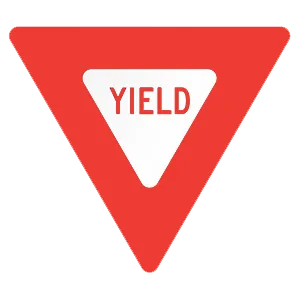Motorcycle Test | License NJ 2026 | FREE Online Practice! #1 Page 4 of 7
Take this FREE motorcycle test (license in NJ 2026) to check your knowledge of the road rules. To improve your results, download a motorcycle handbook online, study theory, and practice for free on our website. Still worried about how to get a motorcycle license in New Jersey in 2026? Check our website for more sample tests, train as much as possible, and boost your grades!
22 . When a vehicle attempts to pass you from behind, you should:
When being passed, it is generally best to ride in the center portion of your lane. Being too close to the passing vehicle increases the risk of a collision.
23 . This sign means:

Decrease your speed as you approach an intersection with a yield sign. Prepare to stop and yield the right-of-way to vehicles and pedestrians in the intersection or crossroad. You must come to a full stop at a yield sign if traffic conditions require it.
24 . To swerve correctly:
To execute a swerve, press the handgrip on the side of your desired turn. Press on the opposite handgrip to return to your original direction after you are clear of the hazard.
25 . When operating a motorcycle on a slippery surface, you should:
When riding on slippery surfaces, you should reduce your speed. Make certain to use both brakes when braking and avoid making sudden moves.
26 . Which fabric provides the most protection when worn by motorcyclists?
Leather jackets and pants provide the greatest level of protection when riding.
27 . If you must swerve, you should:
If you must swerve to avoid a hazard, apply a small amount of pressure to the appropriate handle grip. To swerve to the left, press the left handle grip, then press the right to recover. To swerve to the right, press the right handle grip, then the left.
28 . When being followed too closely by another vehicle, you should:
The best way to deal with a tailgater is to get them ahead of you. If you can do so safely, change lanes and let them pass. Speeding up may only increase the danger by encouraging them to continue tailgating you at a higher speed.
See the exact questions that will be on the 2026 New Jersey DMV exam.
99.2% of people who use the cheat sheet pass the FIRST TIME
Jeneen was tired of paying $5/gallon. She got herself a scooter that required the motorcycle license. She studyed the motorcycle test cheat sheet and passed her test the next day!
Christopher tells us how he knew nothing prior to obtaining the motorcycle study guide, and he only got one question wrong because he clicked on the wrong answer by mistake.



